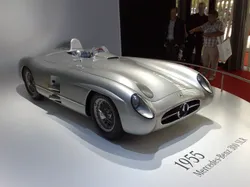

Mercedes-Benz 300 SLR and W196 Overview
Explore the Mercedes-Benz 300 SLR and W196, iconic models known for their performance and design, popular in Portugal's classic car community.
The Mercedes-Benz 300 SLR W196, a pinnacle of engineering and design, is a car that holds a special place in the history of motorsport. First introduced in 1955, this racing car was an evolution of the W...
Technical Specifications
Select Version
Dimensions
Engine
Driving
Others
History and Features
Mycarro AI
Apr 26, 2025
The Mercedes-Benz 300 SLR W196, a pinnacle of engineering and design, is a car that holds a special place in the history of motorsport. First introduced in 1955, this racing car was an evolution of the W196 Formula One car and quickly became renowned for its exceptional performance on the track. Its sleek lines and avant-garde technology combined to create a machine that not only conquered races but also captured the hearts of car enthusiasts worldwide.
Design and Engineering Marvel
The 300 SLR W196 was designed by the legendary engineer Rudolf Uhlenhaut, who played a pivotal role in its development. One of the most striking features of the car was its aluminum body, which not only contributed to its alluring aesthetics but also kept the weight to a minimum. The aerodynamic body shape was essential for reducing drag, allowing the W196 to slice through the air effortlessly, providing both speed and stability at high velocities.
Equipped with a 3.0-liter straight-eight engine, the 300 SLR produced an impressive output of around 310 horsepower. This engine was allied with a lightweight frame made of magnesium and aluminum, which ensured a remarkable power-to-weight ratio. The car was capable of accelerating from 0 to 60 mph in just under 4 seconds, a feat that was groundbreaking at the time. The combination of power and lightweight construction solidified the W196’s place as an engineering triumph.
Racing Legacy
The 300 SLR W196 made its mark in racing history by competing successfully at prestigious events such as the Mille Miglia, where it claimed victory due to its extraordinary handling and speed. In 1955, the vehicle achieved victory in this grueling 1,000-mile race, driven by the legendary Juan Manuel Fangio, who would go on to become one of the most revered figures in motorsport. This iconic win not only showcased the car's capabilities but also reinforced Mercedes-Benz's commitment to excellence in racing.
In addition to its success in endurance racing, the W196 also had a notable presence in sports car racing, where its design philosophy and engineering prowess led it to triumphs on several prominent tracks. The car was lauded for its ability to balance high-speed performance with precise handling, making it a formidable competitor on any circuit.
Technological Innovations
The innovation found in the 300 SLR W196 extended beyond its stunning design and robust performance. The car introduced several technological advances that set new standards in racing. One notable feature was its independent suspension system, which provided enhanced handling characteristics over uneven and challenging surfaces. This technology was revolutionary for its time and gave the W196 an edge over competitors who had yet to adopt similar systems.
Another significant advancement was the inclusion of disc brakes, a technology that was relatively new during this era. The W196 employed these brakes to deliver superior stopping power, especially on high-speed circuits. These advancements in braking and suspension allowed the 300 SLR to maintain control and precision, solidifying its reputation as a top-tier racing machine.
Enduring Influence
The Mercedes-Benz 300 SLR W196's influence on the automotive industry cannot be understated. Its design and engineering have inspired countless vehicles since its introduction, with subsequent generations of performance cars drawing from its pioneering innovations. The spirit of the W196 lives on today in modern Mercedes-Benz models that continue to prioritize performance, safety, and technology.
Car enthusiasts and collectors cherish the W196, often showcasing it at prestigious events and classic car shows. As a rare and highly sought-after vehicle, it represents an important chapter in automotive and motorsport history. The 300 SLR W196 remains not just a car but a symbol of excellence, capturing the imagination of anyone who appreciates the art of driving.
Conclusion
The Mercedes-Benz 300 SLR W196 stands as an iconic marvel in the realm of motorsport and engineering. With a legacy defined by performance, design, and technological innovation, it has left an indelible mark on the automotive landscape. The story of the W196 is a testament to the relentless pursuit of excellence, and it continues to inspire future generations of engineers, designers, and racing enthusiasts. Its place in history is forever secured as a classic that paved the way for the future of high-performance automobiles.
